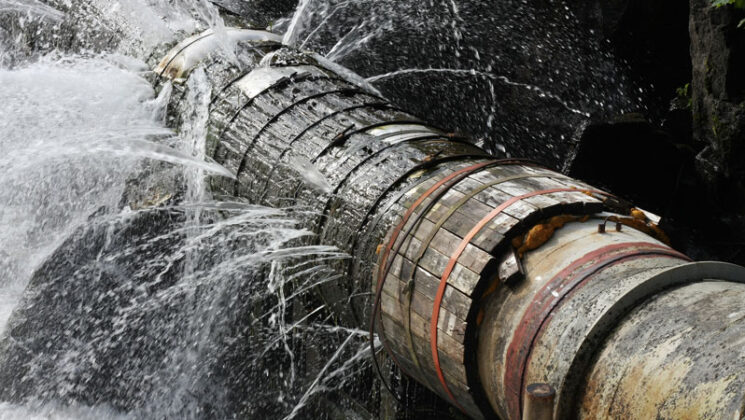Image © Bigstock
On 27 June this year, Sarah Bentley, then CEO of Thames Water, announced she would be resigning from her role. She had been in the position for just under three years.
The announcement sparked a whirlwind fortnight of reports which claimed that the company was: leaking water at the highest rate for five years; fined over £3m for dumping sewage into waterways; and on the verge of imminent bankruptcy, with last-minute backroom investment talks taking place to save the company amidst rumours of renationalisation.
Ricky Cullen and Iggy Pont Lezica are, respectively, branch and assistant branch secretary at UNISON’s Thames Water branch. They spoke about how the UK’s largest water company, serving almost 40% of the population, came to be in this dire position.
“Interestingly, my wife asked me this yesterday,” says Iggy, “For me, I think the whole situation has reached a crescendo.”
How did we end up here?
The history of Thames Water is a long one. The company’s origins date from the early 17th century with the New River Company, through the creation of the publicly owned Metropolitan Water Board in 1904, before privatisation in 1989 as Thames Water.
It ran relatively quietly for almost two decades, before a takeover by the Macquarie Group in 2007. That was when the debt started to rise – tripling over the next decade from £3.2bn to £10.5bn. Also, during these years, the company was paying out giant dividends to shareholders.

Iggy Pont Lezica and Ricky Cullen
“Thames Water is massively asset rich,” says Iggy, “So what we saw, during the Macquarie years, was not only borrowing against those assets but also selling them off.
“Anything that was ‘prime London real estate’ was sold off. We would sell things for a peppercorn to a development arm but never get the profit, because that development company, owned by Macquarie, would get it.”
Thames Water is now running with very little ‘headroom’ – the built in overcapacity in a system that allows elements to be taken offline for maintenance without impacting performance.
“Headroom was seen as wasted money,” says Iggy. Ricky adds: “We’ve had years of doing more with less. There’s trimming the fat, but there’s only so much you can trim before you’re cutting into the meat.”
Where was the regulator?
Owners of an essential public service stripping out assets and racking up debts might be the type of situation where you would expect a regulator, in this case Ofwat, to step in.
But, says Iggy, “There’s definitely a feeling that Ofwat have been asleep at the wheel and that they don’t have enough bite to regulate.
“As workers, we can influence some things, locally, but we can’t influence the financial structure models. We feel that Ofwat can and maybe should have done that.”
Ricky adds: “I think they misunderstood their role, they thought it was just to keep customer bills as low as possible. But, with inflation, the cost of people, the cost of energy, the cost of everything is going up. So, to synthetically keep water bills at their same value doesn’t follow any form of logic.”
Ofwat has become more visible over the last 18 months due to an increasing public focus on untreated sewage making its way into UK waterways.
“They are certainly quick to fine companies, but I actually don’t think the companies themselves or the shareholders take the hit,” says Ricky. “What we see, as a result of the financial penalties, is the company coming to us as a trade union, cap in hand, saying: ‘The coffers are empty, we can’t employ more people, we can’t give you pay increases, the employees need to understand it’s a hard time.’”
The company’s most valuable assets
On the topic of the workforce, Ricky continues: “We talk a lot about investment in assets, but your employees are one of your biggest assets. They’re the people who keep things working, who deliver the turnaround plan, who go above and beyond.
“But this company are so focussed on investing in physical assets over people, right now, that they’re missing the bigger picture. They need those people.”
As an example, Thames Water has just passed its settlement date for the 2023/24 pay process, without even having made an offer. Ricky and Iggy report that it’s normal for negotiations and disputes to continue past this date, but almost unheard of to not have received even a first offer by now.
For Iggy, “Our members come to work because they want the best outcome for customers. Quite often, they give their own time to achieve that. This company runs on goodwill.”
Ricky adds: “If you fail to take that into account, you’re going to end up with the first industrial action in our company in almost 30 years.”
Renationalisation
During the rush of media coverage, there were consistent rumours that the government was considering taking the company back into public ownership, temporarily.
UNISON’s position is that a temporary renationalisation doesn’t go far enough, and that profit has no place in a public service. Iggy describes the mindset of workers in the water industry: “It’s a moral mindset, a spirit that what we do is a public good, that it’s a public service and that it fits in with the nationalisation discussion.
“There is definitely an anger around dividends, about how much money has been extracted and the reality that money leaving the business was just going to the holding company.
“Somehow, we need to capitalise on this crisis, even if it’s not an immediate change of regime. Like I say, we’ve reached a crescendo, and we need to build on that, we can’t just let it die down.”





